Deck 3: Differentiation
Question
Question
Question
Question
Question
Question
Question
Question
Question
Question
Question
Question
Question
Question
Question
Question
Question
Question
Question
Question
Question
Question
Question
Question
Question
Question
Question
Question
Question
Question
Question
Question
Question
Question
Question
Question
Question
Question
Question
Question
Question
Question
Question
Question
Question
Question
Question
Question
Question
Question
Question
Question
Question
Question
Question
Question
Question
Question
Question
Question
Question
Question
Question
Question
Question
Question
Question
Question
Question
Question
Question
Question
Question
Question
Question
Question
Question
Question
Question
Question

Unlock Deck
Sign up to unlock the cards in this deck!
Unlock Deck
Unlock Deck
1/208
Play
Full screen (f)
Deck 3: Differentiation
1
An isosceles triangle is inscribed in a semicircle,as shown in the diagram,and it continues to be inscribed as the semicircle changes size.The area of the semicircle is increasing at the rate of 1 cm2/sec when the radius of the semicircle is 6 cm.
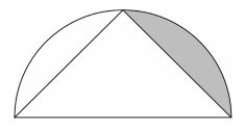
How fast is the radius of the semicircle increasing when the radius is 6 cm? Include units in your answer. Round your answer to 3 decimal places.

How fast is the radius of the semicircle increasing when the radius is 6 cm? Include units in your answer. Round your answer to 3 decimal places.
0.053 cm/sec
2
What does the limit statement  represent?
represent?
A)0
B)
C) ,if
,if

D)6
 represent?
represent? A)0
B)

C)
 ,if
,if
D)6
 ,if
,if

 ,if
,if
3
If  ,find
,find  in terms of
in terms of  and
and  .
.
A)
B)
C)
D)
 ,find
,find  in terms of
in terms of  and
and  .
. A)

B)

C)

D)



4
Find the second derivative of  if
if  .
.
A)
B)
C)
D)
 if
if  .
. A)

B)

C)

D)


Unlock Deck
Unlock for access to all 208 flashcards in this deck.
Unlock Deck
k this deck
5
For what values of  and
and  is the piecewise function
is the piecewise function  differentiable?
differentiable?
A) and
and

B) and
and

C) and
and

D) and
and

 and
and  is the piecewise function
is the piecewise function  differentiable?
differentiable? A)
 and
and
B)
 and
and
C)
 and
and
D)
 and
and

Unlock Deck
Unlock for access to all 208 flashcards in this deck.
Unlock Deck
k this deck
6
Find  for
for  .
.
A)
B)
C)
D)
 for
for  .
. A)

B)

C)

D)


Unlock Deck
Unlock for access to all 208 flashcards in this deck.
Unlock Deck
k this deck
7
How fast is the perimeter of the semicircle increasing when the radius is 6 cm? Include units in your answer.Round your answer to 3 decimal places.

Unlock Deck
Unlock for access to all 208 flashcards in this deck.
Unlock Deck
k this deck
8
Complete two iterations of Newton's Method for the function  using the initial guess
using the initial guess  .Round all numerical values in your answer to four decimal places.
.Round all numerical values in your answer to four decimal places.
A)






1





2





B)






1





2





C)






1





2





D)






1





2





E)






1





2





 using the initial guess
using the initial guess  .Round all numerical values in your answer to four decimal places.
.Round all numerical values in your answer to four decimal places. A)






1





2





B)






1





2





C)






1





2





D)






1





2





E)






1





2






Unlock Deck
Unlock for access to all 208 flashcards in this deck.
Unlock Deck
k this deck
9
How fast is the area of the isosceles triangle increasing when the radius is 6 cm? Include units in your answer.Round your answer to 3 decimal places.

Unlock Deck
Unlock for access to all 208 flashcards in this deck.
Unlock Deck
k this deck
10
In right triangle  ,point
,point  is moving along a leg of the right triangle toward point
is moving along a leg of the right triangle toward point  at a rate of
at a rate of  cm/sec and point
cm/sec and point  is moving toward point
is moving toward point  at a rate of
at a rate of  cm/sec along a line containing the other leg of the right triangle,as illustrated in the triangle shown below.What is the rate of change in the area of
cm/sec along a line containing the other leg of the right triangle,as illustrated in the triangle shown below.What is the rate of change in the area of  ,with respect to time,at the instant when
,with respect to time,at the instant when  cm and
cm and  cm?
cm? 
A)-4.48 cm2/sec
B)-3.36 cm2/sec
C)-3.2 cm2/sec
D)-4 cm2/sec
 ,point
,point  is moving along a leg of the right triangle toward point
is moving along a leg of the right triangle toward point  at a rate of
at a rate of  cm/sec and point
cm/sec and point  is moving toward point
is moving toward point  at a rate of
at a rate of  cm/sec along a line containing the other leg of the right triangle,as illustrated in the triangle shown below.What is the rate of change in the area of
cm/sec along a line containing the other leg of the right triangle,as illustrated in the triangle shown below.What is the rate of change in the area of  ,with respect to time,at the instant when
,with respect to time,at the instant when  cm and
cm and  cm?
cm? 
A)-4.48 cm2/sec
B)-3.36 cm2/sec
C)-3.2 cm2/sec
D)-4 cm2/sec

Unlock Deck
Unlock for access to all 208 flashcards in this deck.
Unlock Deck
k this deck
11
How fast is the shaded region increasing when the radius is 6 cm? Include units in your answer.Round your answer to 3 decimal places.

Unlock Deck
Unlock for access to all 208 flashcards in this deck.
Unlock Deck
k this deck
12
If the nth derivative of  is denoted as
is denoted as  and
and  ,then
,then  is the same as
is the same as
A)
B)
C)
D)
 is denoted as
is denoted as  and
and  ,then
,then  is the same as
is the same as A)

B)

C)

D)


Unlock Deck
Unlock for access to all 208 flashcards in this deck.
Unlock Deck
k this deck
13
Find  for
for  .
.
A)
B)
C)
D)
 for
for  .
. A)

B)

C)

D)


Unlock Deck
Unlock for access to all 208 flashcards in this deck.
Unlock Deck
k this deck
14
Find the derivative of the function  .
.
A)
B)
C)
D)
 .
. A)

B)

C)

D)


Unlock Deck
Unlock for access to all 208 flashcards in this deck.
Unlock Deck
k this deck
15
When the height of a cylinder is 18 cm and the radius is 6 cm,the circumference of the cylinder is increasing at a rate of  cm/min,and the height of the cylinder is increasing four times faster than the radius.How fast is the volume of the cylinder changing?
cm/min,and the height of the cylinder is increasing four times faster than the radius.How fast is the volume of the cylinder changing?
A) cm3/min
cm3/min
B) cm3/min
cm3/min
C) cm3/min
cm3/min
D) cm3/min
cm3/min
 cm/min,and the height of the cylinder is increasing four times faster than the radius.How fast is the volume of the cylinder changing?
cm/min,and the height of the cylinder is increasing four times faster than the radius.How fast is the volume of the cylinder changing? A)
 cm3/min
cm3/minB)
 cm3/min
cm3/minC)
 cm3/min
cm3/minD)
 cm3/min
cm3/min
Unlock Deck
Unlock for access to all 208 flashcards in this deck.
Unlock Deck
k this deck
16
Complete two iterations of Newton's Method for the function  using the initial guess 0.8.Round your answers to four decimal places.
using the initial guess 0.8.Round your answers to four decimal places.
A)1.0251,1.0001
B)1.0251,1.0005
C)1.0251,1.0004
D)1.0248,1.0002
E)1.0250,1.0003
 using the initial guess 0.8.Round your answers to four decimal places.
using the initial guess 0.8.Round your answers to four decimal places. A)1.0251,1.0001
B)1.0251,1.0005
C)1.0251,1.0004
D)1.0248,1.0002
E)1.0250,1.0003

Unlock Deck
Unlock for access to all 208 flashcards in this deck.
Unlock Deck
k this deck
17
If  ,then
,then 
A)
B)
C)
D)
 ,then
,then 
A)

B)

C)

D)


Unlock Deck
Unlock for access to all 208 flashcards in this deck.
Unlock Deck
k this deck
18
If  ,
,  and
and  ,what is the equation of the tangent line to
,what is the equation of the tangent line to  at
at  ?
?
A)
B)
C)
D)
 ,
,  and
and  ,what is the equation of the tangent line to
,what is the equation of the tangent line to  at
at  ?
? A)

B)

C)

D)


Unlock Deck
Unlock for access to all 208 flashcards in this deck.
Unlock Deck
k this deck
19
Find  if
if  .
.
A)
B)
C)
D)
 if
if  .
. A)

B)

C)

D)


Unlock Deck
Unlock for access to all 208 flashcards in this deck.
Unlock Deck
k this deck
20
For what positive value of  does the tangent line to the curve
does the tangent line to the curve  intersect the
intersect the  -axis at the point
-axis at the point  ?
?
A)4.076
B)3.375
C)3.638
D)4.383
 does the tangent line to the curve
does the tangent line to the curve  intersect the
intersect the  -axis at the point
-axis at the point  ?
? A)4.076
B)3.375
C)3.638
D)4.383

Unlock Deck
Unlock for access to all 208 flashcards in this deck.
Unlock Deck
k this deck
21
Use Newton's Method to approximate the zero(s)of the function  accurate to three decimal places.
accurate to three decimal places.
A)0.486
B)-0.486
C)-0.528
D)0.517
E)0.433
 accurate to three decimal places.
accurate to three decimal places. A)0.486
B)-0.486
C)-0.528
D)0.517
E)0.433

Unlock Deck
Unlock for access to all 208 flashcards in this deck.
Unlock Deck
k this deck
22
Find the rate of change of the distance D between the origin and a moving point on the graph of  if
if  centimeters per second.
centimeters per second.
A)
B)
C)
D)
E)
 if
if  centimeters per second.
centimeters per second. A)

B)

C)

D)

E)


Unlock Deck
Unlock for access to all 208 flashcards in this deck.
Unlock Deck
k this deck
23
Assume that x and y are both differentiable functions of t.Find  when
when  and
and  for the equation
for the equation  .
.
A)
B)
C)
D)
E)
 when
when  and
and  for the equation
for the equation  .
. A)

B)

C)

D)

E)


Unlock Deck
Unlock for access to all 208 flashcards in this deck.
Unlock Deck
k this deck
24
A spherical balloon is inflated with gas at the rate of 900 cubic centimeters per minute.How fast is the radius of the balloon increasing at the instant the radius is 70 centimeters?
A) cm/min
cm/min
B) cm/min
cm/min
C) cm/min
cm/min
D) cm/min
cm/min
E) cm/min
cm/min
A)
 cm/min
cm/minB)
 cm/min
cm/minC)
 cm/min
cm/minD)
 cm/min
cm/minE)
 cm/min
cm/min
Unlock Deck
Unlock for access to all 208 flashcards in this deck.
Unlock Deck
k this deck
25
Apply Newton's Method to approximate the x-value of the indicated point of intersection of ![<strong>Apply Newton's Method to approximate the x-value of the indicated point of intersection of and .Continue the process until two successive approximations differ by less than 0.001.[Hint: Let .] Round your answer to three decimal places. </strong> A)5.494 B)8.725 C)6.494 D)7.725 E)4.641](https://storage.examlex.com/TB7497/11eac44f_ed7b_b7de_bedf_75287be0337e_TB7497_11.jpg) and
and ![<strong>Apply Newton's Method to approximate the x-value of the indicated point of intersection of and .Continue the process until two successive approximations differ by less than 0.001.[Hint: Let .] Round your answer to three decimal places. </strong> A)5.494 B)8.725 C)6.494 D)7.725 E)4.641](https://storage.examlex.com/TB7497/11eac44f_ed7b_b7df_bedf_01e172698f2b_TB7497_11.jpg) .Continue the process until two successive approximations differ by less than 0.001.[Hint: Let
.Continue the process until two successive approximations differ by less than 0.001.[Hint: Let ![<strong>Apply Newton's Method to approximate the x-value of the indicated point of intersection of and .Continue the process until two successive approximations differ by less than 0.001.[Hint: Let .] Round your answer to three decimal places. </strong> A)5.494 B)8.725 C)6.494 D)7.725 E)4.641](https://storage.examlex.com/TB7497/11eac44f_ed7b_def0_bedf_590d9d60775b_TB7497_11.jpg) .] Round your answer to three decimal places.
.] Round your answer to three decimal places.
![<strong>Apply Newton's Method to approximate the x-value of the indicated point of intersection of and .Continue the process until two successive approximations differ by less than 0.001.[Hint: Let .] Round your answer to three decimal places. </strong> A)5.494 B)8.725 C)6.494 D)7.725 E)4.641](https://storage.examlex.com/TB7497/11eac44f_ed7b_def1_bedf_f1ba8e8024af_TB7497_00.jpg)
A)5.494
B)8.725
C)6.494
D)7.725
E)4.641
![<strong>Apply Newton's Method to approximate the x-value of the indicated point of intersection of and .Continue the process until two successive approximations differ by less than 0.001.[Hint: Let .] Round your answer to three decimal places. </strong> A)5.494 B)8.725 C)6.494 D)7.725 E)4.641](https://storage.examlex.com/TB7497/11eac44f_ed7b_b7de_bedf_75287be0337e_TB7497_11.jpg) and
and ![<strong>Apply Newton's Method to approximate the x-value of the indicated point of intersection of and .Continue the process until two successive approximations differ by less than 0.001.[Hint: Let .] Round your answer to three decimal places. </strong> A)5.494 B)8.725 C)6.494 D)7.725 E)4.641](https://storage.examlex.com/TB7497/11eac44f_ed7b_b7df_bedf_01e172698f2b_TB7497_11.jpg) .Continue the process until two successive approximations differ by less than 0.001.[Hint: Let
.Continue the process until two successive approximations differ by less than 0.001.[Hint: Let ![<strong>Apply Newton's Method to approximate the x-value of the indicated point of intersection of and .Continue the process until two successive approximations differ by less than 0.001.[Hint: Let .] Round your answer to three decimal places. </strong> A)5.494 B)8.725 C)6.494 D)7.725 E)4.641](https://storage.examlex.com/TB7497/11eac44f_ed7b_def0_bedf_590d9d60775b_TB7497_11.jpg) .] Round your answer to three decimal places.
.] Round your answer to three decimal places.
![<strong>Apply Newton's Method to approximate the x-value of the indicated point of intersection of and .Continue the process until two successive approximations differ by less than 0.001.[Hint: Let .] Round your answer to three decimal places. </strong> A)5.494 B)8.725 C)6.494 D)7.725 E)4.641](https://storage.examlex.com/TB7497/11eac44f_ed7b_def1_bedf_f1ba8e8024af_TB7497_00.jpg)
A)5.494
B)8.725
C)6.494
D)7.725
E)4.641

Unlock Deck
Unlock for access to all 208 flashcards in this deck.
Unlock Deck
k this deck
26
The radius r of a sphere is increasing at a rate of 9 inches per minute.Find the rate of change of the volume when r = 11 inches.
A) in3/min
in3/min
B) in3/min
in3/min
C) in3/min
in3/min
D) in3/min
in3/min
E) in3/min
in3/min
A)
 in3/min
in3/minB)
 in3/min
in3/minC)
 in3/min
in3/minD)
 in3/min
in3/minE)
 in3/min
in3/min
Unlock Deck
Unlock for access to all 208 flashcards in this deck.
Unlock Deck
k this deck
27
The radius,r,of a circle is increasing at a rate of 3 centimeters per minute.Find the rate of change of area,A,when the radius is 6.
A)

B)

C)

D)

E)

A)


B)


C)


D)


E)



Unlock Deck
Unlock for access to all 208 flashcards in this deck.
Unlock Deck
k this deck
28
Approximate the fixed point of the function ![<strong>Approximate the fixed point of the function between and to two decimal places.[A fixed point of a function f is a value of x such that .] </strong> A)0.65 B)0 C)0.74 D)1.00 E)0.91](https://storage.examlex.com/TB7497/11eac44f_ed7c_0602_bedf_89d9554ac666_TB7497_11.jpg) between
between ![<strong>Approximate the fixed point of the function between and to two decimal places.[A fixed point of a function f is a value of x such that .] </strong> A)0.65 B)0 C)0.74 D)1.00 E)0.91](https://storage.examlex.com/TB7497/11eac44f_ed7c_2d13_bedf_83df2f1c005c_TB7497_11.jpg) and
and ![<strong>Approximate the fixed point of the function between and to two decimal places.[A fixed point of a function f is a value of x such that .] </strong> A)0.65 B)0 C)0.74 D)1.00 E)0.91](https://storage.examlex.com/TB7497/11eac44f_ed7c_2d14_bedf_ef84476fecef_TB7497_11.jpg) to two decimal places.[A fixed point
to two decimal places.[A fixed point ![<strong>Approximate the fixed point of the function between and to two decimal places.[A fixed point of a function f is a value of x such that .] </strong> A)0.65 B)0 C)0.74 D)1.00 E)0.91](https://storage.examlex.com/TB7497/11eac44f_ed7c_2d15_bedf_1dfc275a637a_TB7497_11.jpg) of a function f is a value of x such that
of a function f is a value of x such that ![<strong>Approximate the fixed point of the function between and to two decimal places.[A fixed point of a function f is a value of x such that .] </strong> A)0.65 B)0 C)0.74 D)1.00 E)0.91](https://storage.examlex.com/TB7497/11eac44f_ed7c_5426_bedf_6152333158d6_TB7497_11.jpg) .]
.]
A)0.65
B)0
C)0.74
D)1.00
E)0.91
![<strong>Approximate the fixed point of the function between and to two decimal places.[A fixed point of a function f is a value of x such that .] </strong> A)0.65 B)0 C)0.74 D)1.00 E)0.91](https://storage.examlex.com/TB7497/11eac44f_ed7c_0602_bedf_89d9554ac666_TB7497_11.jpg) between
between ![<strong>Approximate the fixed point of the function between and to two decimal places.[A fixed point of a function f is a value of x such that .] </strong> A)0.65 B)0 C)0.74 D)1.00 E)0.91](https://storage.examlex.com/TB7497/11eac44f_ed7c_2d13_bedf_83df2f1c005c_TB7497_11.jpg) and
and ![<strong>Approximate the fixed point of the function between and to two decimal places.[A fixed point of a function f is a value of x such that .] </strong> A)0.65 B)0 C)0.74 D)1.00 E)0.91](https://storage.examlex.com/TB7497/11eac44f_ed7c_2d14_bedf_ef84476fecef_TB7497_11.jpg) to two decimal places.[A fixed point
to two decimal places.[A fixed point ![<strong>Approximate the fixed point of the function between and to two decimal places.[A fixed point of a function f is a value of x such that .] </strong> A)0.65 B)0 C)0.74 D)1.00 E)0.91](https://storage.examlex.com/TB7497/11eac44f_ed7c_2d15_bedf_1dfc275a637a_TB7497_11.jpg) of a function f is a value of x such that
of a function f is a value of x such that ![<strong>Approximate the fixed point of the function between and to two decimal places.[A fixed point of a function f is a value of x such that .] </strong> A)0.65 B)0 C)0.74 D)1.00 E)0.91](https://storage.examlex.com/TB7497/11eac44f_ed7c_5426_bedf_6152333158d6_TB7497_11.jpg) .]
.] A)0.65
B)0
C)0.74
D)1.00
E)0.91

Unlock Deck
Unlock for access to all 208 flashcards in this deck.
Unlock Deck
k this deck
29
Use Newton's Method to approximate the x-value of the indicated point of intersection of the two graphs accurate to three decimal places.Continue the process until two successive approximations differ by less than 0.001.[Hint: Let ![<strong>Use Newton's Method to approximate the x-value of the indicated point of intersection of the two graphs accurate to three decimal places.Continue the process until two successive approximations differ by less than 0.001.[Hint: Let .] </strong> A)2.651 B)2.703 C)2.660 D)2.764 E)2.600](https://storage.examlex.com/TB7497/11eac44f_ed7b_69ba_bedf_a70ede936697_TB7497_11.jpg) .]
.] ![<strong>Use Newton's Method to approximate the x-value of the indicated point of intersection of the two graphs accurate to three decimal places.Continue the process until two successive approximations differ by less than 0.001.[Hint: Let .] </strong> A)2.651 B)2.703 C)2.660 D)2.764 E)2.600](https://storage.examlex.com/TB7497/11eac44f_ed7b_69bb_bedf_0581db52c5fd_TB7497_11.jpg)
![<strong>Use Newton's Method to approximate the x-value of the indicated point of intersection of the two graphs accurate to three decimal places.Continue the process until two successive approximations differ by less than 0.001.[Hint: Let .] </strong> A)2.651 B)2.703 C)2.660 D)2.764 E)2.600](https://storage.examlex.com/TB7497/11eac44f_ed7b_90cc_bedf_eb9eede64374_TB7497_00.jpg)
![<strong>Use Newton's Method to approximate the x-value of the indicated point of intersection of the two graphs accurate to three decimal places.Continue the process until two successive approximations differ by less than 0.001.[Hint: Let .] </strong> A)2.651 B)2.703 C)2.660 D)2.764 E)2.600](https://storage.examlex.com/TB7497/11eac44f_ed7b_90cd_bedf_9be08b6e5f89_TB7497_00.jpg)
A)2.651
B)2.703
C)2.660
D)2.764
E)2.600
![<strong>Use Newton's Method to approximate the x-value of the indicated point of intersection of the two graphs accurate to three decimal places.Continue the process until two successive approximations differ by less than 0.001.[Hint: Let .] </strong> A)2.651 B)2.703 C)2.660 D)2.764 E)2.600](https://storage.examlex.com/TB7497/11eac44f_ed7b_69ba_bedf_a70ede936697_TB7497_11.jpg) .]
.] ![<strong>Use Newton's Method to approximate the x-value of the indicated point of intersection of the two graphs accurate to three decimal places.Continue the process until two successive approximations differ by less than 0.001.[Hint: Let .] </strong> A)2.651 B)2.703 C)2.660 D)2.764 E)2.600](https://storage.examlex.com/TB7497/11eac44f_ed7b_69bb_bedf_0581db52c5fd_TB7497_11.jpg)
![<strong>Use Newton's Method to approximate the x-value of the indicated point of intersection of the two graphs accurate to three decimal places.Continue the process until two successive approximations differ by less than 0.001.[Hint: Let .] </strong> A)2.651 B)2.703 C)2.660 D)2.764 E)2.600](https://storage.examlex.com/TB7497/11eac44f_ed7b_90cc_bedf_eb9eede64374_TB7497_00.jpg)
![<strong>Use Newton's Method to approximate the x-value of the indicated point of intersection of the two graphs accurate to three decimal places.Continue the process until two successive approximations differ by less than 0.001.[Hint: Let .] </strong> A)2.651 B)2.703 C)2.660 D)2.764 E)2.600](https://storage.examlex.com/TB7497/11eac44f_ed7b_90cd_bedf_9be08b6e5f89_TB7497_00.jpg)
A)2.651
B)2.703
C)2.660
D)2.764
E)2.600

Unlock Deck
Unlock for access to all 208 flashcards in this deck.
Unlock Deck
k this deck
30
All edges of a cube are expanding at a rate of 9 centimeters per second.How fast is the volume changing when each edge is 2 centimeters?
A)486
B)72
C)36
D)108
E)162
A)486

B)72

C)36

D)108

E)162


Unlock Deck
Unlock for access to all 208 flashcards in this deck.
Unlock Deck
k this deck
31
A point is moving along the graph of the function  such that
such that  centimeters per second.Find
centimeters per second.Find  when x = 1.
when x = 1.
A)
B)
C)
D)
E)
 such that
such that  centimeters per second.Find
centimeters per second.Find  when x = 1.
when x = 1. A)

B)

C)

D)

E)


Unlock Deck
Unlock for access to all 208 flashcards in this deck.
Unlock Deck
k this deck
32
Approximate the positive zero(s)of the function  to three decimal places.Use Newton's Method and continue the process until two successive approximations differ by less than 0.001.
to three decimal places.Use Newton's Method and continue the process until two successive approximations differ by less than 0.001.
A)-1.304
B)1.202
C)1.179
D)-1.202
E)1.253
 to three decimal places.Use Newton's Method and continue the process until two successive approximations differ by less than 0.001.
to three decimal places.Use Newton's Method and continue the process until two successive approximations differ by less than 0.001. A)-1.304
B)1.202
C)1.179
D)-1.202
E)1.253

Unlock Deck
Unlock for access to all 208 flashcards in this deck.
Unlock Deck
k this deck
33
Suppose that the total number of arrests T (in thousands)for all males ages 14 to 27 in 2006 is approximated by the model  where x is the age in years (see figure).Approximate the two ages to one decimal place that had total arrests of 300 thousand.
where x is the age in years (see figure).Approximate the two ages to one decimal place that had total arrests of 300 thousand. 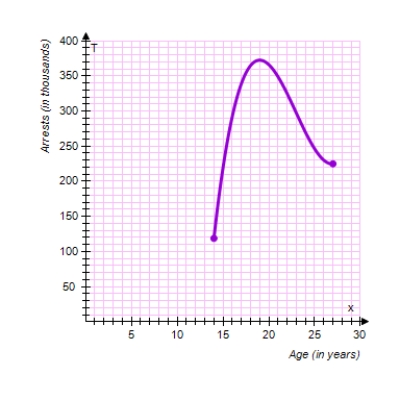
A)16.1;22.9
B)17.4;21.3
C)15.1;25.9
D)16.1;25.9
E)15.1;21.3
 where x is the age in years (see figure).Approximate the two ages to one decimal place that had total arrests of 300 thousand.
where x is the age in years (see figure).Approximate the two ages to one decimal place that had total arrests of 300 thousand. 
A)16.1;22.9
B)17.4;21.3
C)15.1;25.9
D)16.1;25.9
E)15.1;21.3

Unlock Deck
Unlock for access to all 208 flashcards in this deck.
Unlock Deck
k this deck
34
Use Newton's Method to approximate the zero(s)of the function  accurate to three decimal places.
accurate to three decimal places.
A)19.314
B)-19.346
C)19.251
D)-19.314
E)19.365
 accurate to three decimal places.
accurate to three decimal places. A)19.314
B)-19.346
C)19.251
D)-19.314
E)19.365

Unlock Deck
Unlock for access to all 208 flashcards in this deck.
Unlock Deck
k this deck
35
A point is moving along the graph of the function  such that
such that  centimeters per second.Find
centimeters per second.Find  when
when  .
.
A)
B)
C)
D)
E)
 such that
such that  centimeters per second.Find
centimeters per second.Find  when
when  .
. A)

B)

C)

D)

E)


Unlock Deck
Unlock for access to all 208 flashcards in this deck.
Unlock Deck
k this deck
36
A manufacturer of digital audio players estimates that the profit for selling a particular model is  where P is the profit in dollars and x is the advertising expense in 10,000's of dollars (see figure).Find the smaller of two advertising amounts that yield a profit P of $1,900,000.Round your answer to the nearest dollar.
where P is the profit in dollars and x is the advertising expense in 10,000's of dollars (see figure).Find the smaller of two advertising amounts that yield a profit P of $1,900,000.Round your answer to the nearest dollar. 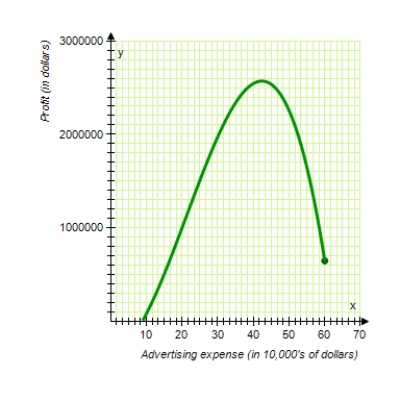
A)$532,519
B)$291,308
C)$271,308
D)$460,892
E)$315,369
 where P is the profit in dollars and x is the advertising expense in 10,000's of dollars (see figure).Find the smaller of two advertising amounts that yield a profit P of $1,900,000.Round your answer to the nearest dollar.
where P is the profit in dollars and x is the advertising expense in 10,000's of dollars (see figure).Find the smaller of two advertising amounts that yield a profit P of $1,900,000.Round your answer to the nearest dollar. 
A)$532,519
B)$291,308
C)$271,308
D)$460,892
E)$315,369

Unlock Deck
Unlock for access to all 208 flashcards in this deck.
Unlock Deck
k this deck
37
Use Newton's Method to approximate the x-value of the indicated point of intersection of the two graphs accurate to three decimal places.Continue the process until two successive approximations differ by less than 0.001.[Hint: Let ![<strong>Use Newton's Method to approximate the x-value of the indicated point of intersection of the two graphs accurate to three decimal places.Continue the process until two successive approximations differ by less than 0.001.[Hint: Let .] </strong> A)0.444 B)0.371 C)0.432 D)0.393 E)0.476](https://storage.examlex.com/TB7497/11eac44f_ed7b_1b96_bedf_6f9a87291cfd_TB7497_11.jpg) .]
.] ![<strong>Use Newton's Method to approximate the x-value of the indicated point of intersection of the two graphs accurate to three decimal places.Continue the process until two successive approximations differ by less than 0.001.[Hint: Let .] </strong> A)0.444 B)0.371 C)0.432 D)0.393 E)0.476](https://storage.examlex.com/TB7497/11eac44f_ed7b_1b97_bedf_51f9d4cdeccc_TB7497_11.jpg)
![<strong>Use Newton's Method to approximate the x-value of the indicated point of intersection of the two graphs accurate to three decimal places.Continue the process until two successive approximations differ by less than 0.001.[Hint: Let .] </strong> A)0.444 B)0.371 C)0.432 D)0.393 E)0.476](https://storage.examlex.com/TB7497/11eac44f_ed7b_42a8_bedf_afe9165e12b2_TB7497_11.jpg)
![<strong>Use Newton's Method to approximate the x-value of the indicated point of intersection of the two graphs accurate to three decimal places.Continue the process until two successive approximations differ by less than 0.001.[Hint: Let .] </strong> A)0.444 B)0.371 C)0.432 D)0.393 E)0.476](https://storage.examlex.com/TB7497/11eac44f_ed7b_42a9_bedf_4dae52846a62_TB7497_00.jpg)
A)0.444
B)0.371
C)0.432
D)0.393
E)0.476
![<strong>Use Newton's Method to approximate the x-value of the indicated point of intersection of the two graphs accurate to three decimal places.Continue the process until two successive approximations differ by less than 0.001.[Hint: Let .] </strong> A)0.444 B)0.371 C)0.432 D)0.393 E)0.476](https://storage.examlex.com/TB7497/11eac44f_ed7b_1b96_bedf_6f9a87291cfd_TB7497_11.jpg) .]
.] ![<strong>Use Newton's Method to approximate the x-value of the indicated point of intersection of the two graphs accurate to three decimal places.Continue the process until two successive approximations differ by less than 0.001.[Hint: Let .] </strong> A)0.444 B)0.371 C)0.432 D)0.393 E)0.476](https://storage.examlex.com/TB7497/11eac44f_ed7b_1b97_bedf_51f9d4cdeccc_TB7497_11.jpg)
![<strong>Use Newton's Method to approximate the x-value of the indicated point of intersection of the two graphs accurate to three decimal places.Continue the process until two successive approximations differ by less than 0.001.[Hint: Let .] </strong> A)0.444 B)0.371 C)0.432 D)0.393 E)0.476](https://storage.examlex.com/TB7497/11eac44f_ed7b_42a8_bedf_afe9165e12b2_TB7497_11.jpg)
![<strong>Use Newton's Method to approximate the x-value of the indicated point of intersection of the two graphs accurate to three decimal places.Continue the process until two successive approximations differ by less than 0.001.[Hint: Let .] </strong> A)0.444 B)0.371 C)0.432 D)0.393 E)0.476](https://storage.examlex.com/TB7497/11eac44f_ed7b_42a9_bedf_4dae52846a62_TB7497_00.jpg)
A)0.444
B)0.371
C)0.432
D)0.393
E)0.476

Unlock Deck
Unlock for access to all 208 flashcards in this deck.
Unlock Deck
k this deck
38
Assume that x and y are both differentiable functions of t .Find  when
when  and
and  for the equation
for the equation  .
.
A)
B)
C)
D)
E)
 when
when  and
and  for the equation
for the equation  .
. A)

B)

C)

D)

E)


Unlock Deck
Unlock for access to all 208 flashcards in this deck.
Unlock Deck
k this deck
39
Use Newton's Method to approximate the zero(s)of the function  accurate to three decimal places.
accurate to three decimal places.
A)-0.486
B)0.444
C)-0.539
D)0.486
E)-0.437
 accurate to three decimal places.
accurate to three decimal places. A)-0.486
B)0.444
C)-0.539
D)0.486
E)-0.437

Unlock Deck
Unlock for access to all 208 flashcards in this deck.
Unlock Deck
k this deck
40
A conical tank (with vertex down)is 20 feet across the top and 18 feet deep.If water is flowing into the tank at a rate of 20 cubic feet per minute,find the rate of change of the depth of the water when the water is 12 feet deep.
A)

B)

C)

D)

E)

A)


B)


C)


D)


E)



Unlock Deck
Unlock for access to all 208 flashcards in this deck.
Unlock Deck
k this deck
41
Find an equation of the tangent line to the graph of  at the point
at the point  .
.
A)
B)
C)
D)
E)
 at the point
at the point  .
. A)

B)

C)

D)

E)


Unlock Deck
Unlock for access to all 208 flashcards in this deck.
Unlock Deck
k this deck
42
Find the derivative of the function  .
.
A)
B)
C)
D)
E)
 .
. A)

B)

C)

D)

E)


Unlock Deck
Unlock for access to all 208 flashcards in this deck.
Unlock Deck
k this deck
43
A ladder a = 20 feet long is leaning against the wall of a house (see figure).The base of the ladder is pulled away from the wall at a rate of b = 4 feet per second.Find the rate at which the angle between the ladder and the wall of the house is changing when the base of the ladder is 19 feet from the wall.Round your answer to three decimal places. 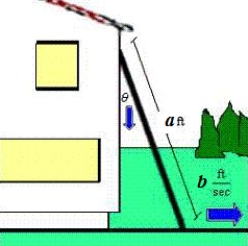
A)0.528
B)0.641
C)4.058
D)7.604
E)0.339

A)0.528

B)0.641

C)4.058

D)7.604

E)0.339


Unlock Deck
Unlock for access to all 208 flashcards in this deck.
Unlock Deck
k this deck
44
An airplane flies at an altitude of h = 6 miles towards a point directly over an observer.Consider θ and x as shown in the following figure.The speed of the plane is 400 miles per hour.Find  when
when  miles.Round your answer to three decimal places.
miles.Round your answer to three decimal places. 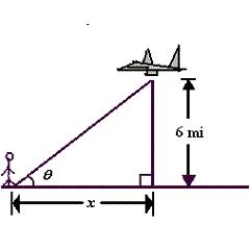
A)-17.647
B)2.941
C)17.647
D)0.044
E)-8.824
 when
when  miles.Round your answer to three decimal places.
miles.Round your answer to three decimal places. 
A)-17.647

B)2.941

C)17.647

D)0.044

E)-8.824


Unlock Deck
Unlock for access to all 208 flashcards in this deck.
Unlock Deck
k this deck
45
Find the derivative of the function  .
.
A)
B)
C)
D)
E)
 .
. A)

B)

C)

D)

E)


Unlock Deck
Unlock for access to all 208 flashcards in this deck.
Unlock Deck
k this deck
46
An airplane is flying in still air with an airspeed of 266 miles per hour.If it is climbing at an angle of 22°,find the rate at which it is gaining altitude.Round your answer to four decimal places.
A)112.4165
B)86.6011
C)120.7615
D)100.7692
E)99.6454
A)112.4165

B)86.6011

C)120.7615

D)100.7692

E)99.6454


Unlock Deck
Unlock for access to all 208 flashcards in this deck.
Unlock Deck
k this deck
47
Find the derivative of the function  .
.
A)
B)
C)
D)
E)
 .
. A)

B)

C)

D)

E)


Unlock Deck
Unlock for access to all 208 flashcards in this deck.
Unlock Deck
k this deck
48
In a free-fall experiment,an object is dropped from a height of a = 256 feet.A camera on the ground 500 feet from the point of impact records the fall of the object as shown in the figure.Assuming the object is released at time t = 0.At what time will the object reach the ground level? 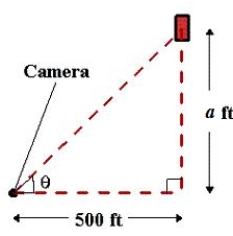
A)3 seconds
B)6 seconds
C)7 seconds
D)5 seconds
E)4 seconds

A)3 seconds
B)6 seconds
C)7 seconds
D)5 seconds
E)4 seconds

Unlock Deck
Unlock for access to all 208 flashcards in this deck.
Unlock Deck
k this deck
49
A man 6 feet tall walks at a rate of 13 feet per second away from a light that is 15 feet above the ground (see figure).When he is 5 feet from the base of the light,at what rate is the length of his shadow changing? 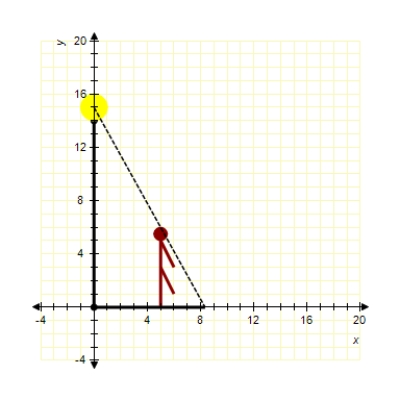
A)

B)

C)

D)

E)


A)


B)


C)


D)


E)



Unlock Deck
Unlock for access to all 208 flashcards in this deck.
Unlock Deck
k this deck
50
A ladder a = 20 feet long is leaning against the wall of a house (see figure).The base of the ladder is pulled away from the wall at a rate of b = 4 feet per second.Consider the triangle formed by the side of the house,the ladder,and the ground.Find the rate at which the area of the triangle is changed when the base of the ladder is 11 feet from the wall.Round your answer to two decimal places. 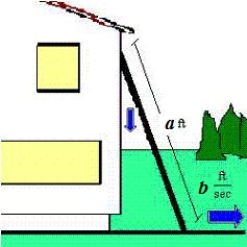
A)1.48
B)33.41
C)153.81
D)18.92
E)53.68

A)1.48

B)33.41

C)153.81

D)18.92

E)53.68


Unlock Deck
Unlock for access to all 208 flashcards in this deck.
Unlock Deck
k this deck
51
Find the slope-intercept form of the equation of the line tangent to the graph of  when
when  .
.
A)
B)
C)
D)
E)
 when
when  .
. A)

B)

C)

D)

E)


Unlock Deck
Unlock for access to all 208 flashcards in this deck.
Unlock Deck
k this deck
52
A ladder a = 20 feet long is leaning against the wall of a house (see figure).The base of the ladder is pulled away from the wall at a rate of b = 4 feet per second.How fast is the top of the ladder moving down the wall when its base is 13 feet from the wall? Round your answer to two decimal places. 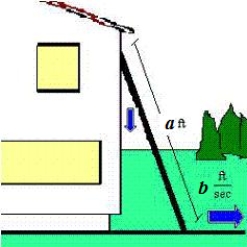
A)5.00
B)-6.86
C)-3.42
D)6.86
E)-6.00

A)5.00

B)-6.86

C)-3.42

D)6.86

E)-6.00


Unlock Deck
Unlock for access to all 208 flashcards in this deck.
Unlock Deck
k this deck
53
Find the derivative of the function  .
.
A)
B)
C)
D)
E)
 .
. A)

B)

C)

D)

E)


Unlock Deck
Unlock for access to all 208 flashcards in this deck.
Unlock Deck
k this deck
54
A man 6 feet tall walks at a rate of 10 feet per second away from a light that is 15 feet above the ground (see figure).When he is 13 feet from the base of the light,at what rate is the tip of his shadow moving? 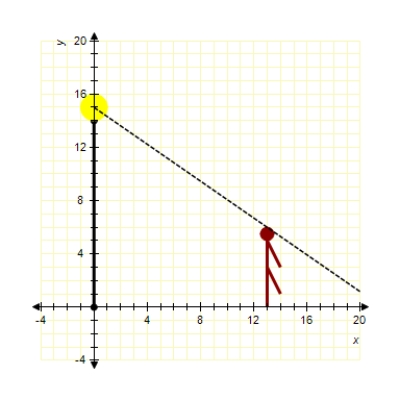
A)

B)50
C)

D)

E)


A)


B)50

C)


D)


E)



Unlock Deck
Unlock for access to all 208 flashcards in this deck.
Unlock Deck
k this deck
55
Find the derivative of the function  .
.
A)
B)
C)
D)
E)
 .
. A)

B)

C)

D)

E)


Unlock Deck
Unlock for access to all 208 flashcards in this deck.
Unlock Deck
k this deck
56
An airplane flies at an altitude of h = 14 miles toward a point directly over an observer.Consider θ and x as shown in the following figure.Write θ as a function of x. 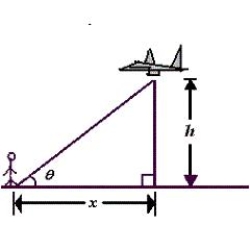
A)
B)
C)
D)
E)

A)

B)

C)

D)

E)


Unlock Deck
Unlock for access to all 208 flashcards in this deck.
Unlock Deck
k this deck
57
Find  at the point
at the point  for the equation
for the equation  .
.
A)
B)
C)
D)
E)
 at the point
at the point  for the equation
for the equation  .
. A)

B)

C)

D)

E)


Unlock Deck
Unlock for access to all 208 flashcards in this deck.
Unlock Deck
k this deck
58
Find the derivative of the function  .
.
A)
B)
C)
D)
E)
 .
. A)

B)

C)

D)

E)


Unlock Deck
Unlock for access to all 208 flashcards in this deck.
Unlock Deck
k this deck
59
Find  at the point
at the point  for the equation
for the equation  .
.
A)
B)
C)
D)
E)
 at the point
at the point  for the equation
for the equation  .
. A)

B)

C)

D)

E)


Unlock Deck
Unlock for access to all 208 flashcards in this deck.
Unlock Deck
k this deck
60
In a free-fall experiment,an object is dropped from a height of a = 144 feet.A camera on the ground 500 feet from the point of impact records the fall of the object as shown in the figure.Assuming the object is released at time t = 0.Find the rate of change of the angle of elevation of the camera when t = 1.Round your answer to four decimal places. 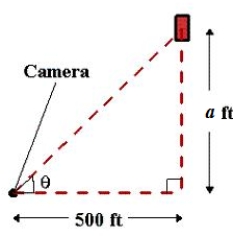
A)-0.6006
B)-0.0581
C)0.0601
D)0.0581
E)-0.0601

A)-0.6006

B)-0.0581

C)0.0601

D)0.0581

E)-0.0601


Unlock Deck
Unlock for access to all 208 flashcards in this deck.
Unlock Deck
k this deck
61
Find  by implicit differentiation.
by implicit differentiation. 
A)
B)
C)
D)
E)
 by implicit differentiation.
by implicit differentiation. 
A)

B)

C)

D)

E)


Unlock Deck
Unlock for access to all 208 flashcards in this deck.
Unlock Deck
k this deck
62
Evaluate  for the equation
for the equation  at the given point
at the given point  .Round your answer to two decimal places if necessary.
.Round your answer to two decimal places if necessary.
A)
B)
C)
D)
E)
 for the equation
for the equation  at the given point
at the given point  .Round your answer to two decimal places if necessary.
.Round your answer to two decimal places if necessary. A)

B)

C)

D)

E)


Unlock Deck
Unlock for access to all 208 flashcards in this deck.
Unlock Deck
k this deck
63
Find  by implicit differentiation given that
by implicit differentiation given that  .
.
A)
B)
C)
D)
E)
 by implicit differentiation given that
by implicit differentiation given that  .
. A)

B)

C)

D)

E)


Unlock Deck
Unlock for access to all 208 flashcards in this deck.
Unlock Deck
k this deck
64
Find  by implicit differentiation.
by implicit differentiation. 
A)
B)
C)
D)
E)
 by implicit differentiation.
by implicit differentiation. 
A)

B)

C)

D)

E)


Unlock Deck
Unlock for access to all 208 flashcards in this deck.
Unlock Deck
k this deck
65
Evaluate  for the equation
for the equation  at the given point
at the given point  .Round your answer to two decimal places if necessary.
.Round your answer to two decimal places if necessary.
A)
B)
C)
D)
E)
 for the equation
for the equation  at the given point
at the given point  .Round your answer to two decimal places if necessary.
.Round your answer to two decimal places if necessary. A)

B)

C)

D)

E)


Unlock Deck
Unlock for access to all 208 flashcards in this deck.
Unlock Deck
k this deck
66
Find  by implicit differentiation.
by implicit differentiation. 
A)
B)
C)
D)
E)
 by implicit differentiation.
by implicit differentiation. 
A)

B)

C)

D)

E)


Unlock Deck
Unlock for access to all 208 flashcards in this deck.
Unlock Deck
k this deck
67
Find  by implicit differentiation.
by implicit differentiation. 
A)
B)
C)
D)
E)
 by implicit differentiation.
by implicit differentiation. 
A)

B)

C)

D)

E)


Unlock Deck
Unlock for access to all 208 flashcards in this deck.
Unlock Deck
k this deck
68
Use implicit differentiation to find  .
. 
A)
B)
C)
D)
E)
 .
. 
A)

B)

C)

D)

E)


Unlock Deck
Unlock for access to all 208 flashcards in this deck.
Unlock Deck
k this deck
69
Use implicit differentiation to find  .
. 
A)
B)
C)
D)
E)
 .
. 
A)

B)

C)

D)

E)


Unlock Deck
Unlock for access to all 208 flashcards in this deck.
Unlock Deck
k this deck
70
Use implicit differentiation to find  at the point
at the point  .
. 
A)
B)
C)
D)
E)
 at the point
at the point  .
. 
A)

B)

C)

D)

E)


Unlock Deck
Unlock for access to all 208 flashcards in this deck.
Unlock Deck
k this deck
71
Find  by implicit differentiation.
by implicit differentiation. 
A)
B)
C)
D)
E)
 by implicit differentiation.
by implicit differentiation. 
A)

B)

C)

D)

E)


Unlock Deck
Unlock for access to all 208 flashcards in this deck.
Unlock Deck
k this deck
72
Find the slope of the tangent line  at the given point
at the given point  .Round your answer to two decimal places if necessary.
.Round your answer to two decimal places if necessary.
A)0.67
B)2
C)1
D)1.67
E)3
 at the given point
at the given point  .Round your answer to two decimal places if necessary.
.Round your answer to two decimal places if necessary. A)0.67
B)2
C)1
D)1.67
E)3

Unlock Deck
Unlock for access to all 208 flashcards in this deck.
Unlock Deck
k this deck
73
Find an equation of the tangent line to the graph of the function given below at the given point.  ,
,  (The coefficients below are given to two decimal places. )
(The coefficients below are given to two decimal places. )
A)
B)
C)
D)
E)
 ,
,  (The coefficients below are given to two decimal places. )
(The coefficients below are given to two decimal places. )A)

B)

C)

D)

E)


Unlock Deck
Unlock for access to all 208 flashcards in this deck.
Unlock Deck
k this deck
74
Use implicit differentiation to find  .
. 
A)
B)
C)
D)
E)
 .
. 
A)

B)

C)

D)

E)


Unlock Deck
Unlock for access to all 208 flashcards in this deck.
Unlock Deck
k this deck
75
A petrol car is parked 50 feet from a long warehouse (see figure).The revolving light on top of the car turns at a rate of 30 revolutions per minute.How fast is the light beam moving along the wall when the beam makes an angle of  with the perpendicular from the light to the wall.
with the perpendicular from the light to the wall. 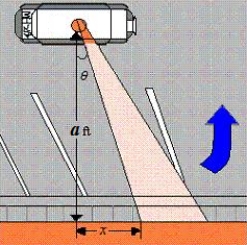
A)

B)

C)

D)

E)

 with the perpendicular from the light to the wall.
with the perpendicular from the light to the wall. 
A)


B)


C)


D)


E)



Unlock Deck
Unlock for access to all 208 flashcards in this deck.
Unlock Deck
k this deck
76
Find  by implicit differentiation.
by implicit differentiation. 
A)
B)
 by implicit differentiation.
by implicit differentiation. 
A)

B)


Unlock Deck
Unlock for access to all 208 flashcards in this deck.
Unlock Deck
k this deck
77
Evaluate  for the equation
for the equation  at the given point
at the given point  .Round your answer to two decimal places if necessary.
.Round your answer to two decimal places if necessary.
A)
B)
C)
D)
E)
 for the equation
for the equation  at the given point
at the given point  .Round your answer to two decimal places if necessary.
.Round your answer to two decimal places if necessary. A)

B)

C)

D)

E)


Unlock Deck
Unlock for access to all 208 flashcards in this deck.
Unlock Deck
k this deck
78
A petrol car is parked a = 40 feet from a long warehouse (see figure).The revolving light on top of the car turns at a rate of 30 revolutions per minute.Write θ as a function of x. 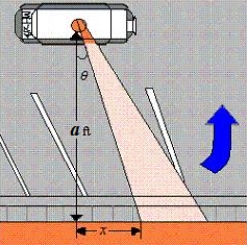
A)
B)
C)
D)
E)

A)

B)

C)

D)

E)


Unlock Deck
Unlock for access to all 208 flashcards in this deck.
Unlock Deck
k this deck
79
Find  by implicit differentiation given that
by implicit differentiation given that  .Use the original equation to simplify your answer.
.Use the original equation to simplify your answer.
A)
B)
C)
D)
E)
 by implicit differentiation given that
by implicit differentiation given that  .Use the original equation to simplify your answer.
.Use the original equation to simplify your answer. A)

B)

C)

D)

E)


Unlock Deck
Unlock for access to all 208 flashcards in this deck.
Unlock Deck
k this deck
80
Find  by implicit differentiation given that
by implicit differentiation given that  .
.
A)
B)
C)
D)
E)
 by implicit differentiation given that
by implicit differentiation given that  .
. A)

B)

C)

D)

E)


Unlock Deck
Unlock for access to all 208 flashcards in this deck.
Unlock Deck
k this deck


